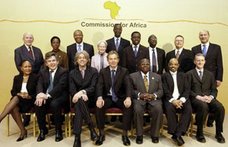Business Action for Africa
Business Action for Africa calls on African governments to continue their efforts to improve the business climate and to tackle the barriers to, and reduce the costs of, doing business. As highlighted by the World Bank’s Doing Business Reports, the Commission for Africa and others, all successful economies are those that have made progress in reforming their investment climates: overcoming onerous bureaucratic requirements; making financial markets work effectively to enable access to capital; tackling sometimes counter-productive regulation; strengthening insecure property rights; and ensuring effective contract enforcement as part of an effective legal system. Such reforms are particularly important for helping smaller businesses to move into the formal sector and grow.Business Action for Africa calls on governments to reiterate their support, and broaden the funding base, for the Investment Climate Facility. Private sector contributions to the ICF, initially led by Business Action for Africa members Anglo American, Royal Dutch Shell, Unilever and SAB Miller have helped to leverage a total fund of some $150 million.As a group, we are optimistic about the prospects for Africa. Recent economic growth has at least in part reflected improved governance and investment climates. The Africa Progress Panel reports that "Foreign Direct Investment into Africa doubled between 2004 and 2005 to an unprecedented US$32 billion, with most of the increase going into the natural resource sectors, especially oil".According to the World Bank, in 2006 2/3 of African countries made at least one reform, and Tanzania and Ghana rank among the top 10 reformers. While Africa in the last two years was the slowest reforming region in the world, this year it is the third fastest, after Eastern Europe and the OECD high-income countries. South Africa and Mauritius are among the world’s top 30 places in terms of ease of doing business. In Côte d’Ivoire registering property took 397 days in 2005. Reforms eliminated a requirement to obtain the urban minister’s consent to transfer property. Now it takes 32 days. Burkina Faso cut the procedures for starting a business from 12 to 8 and the time from 45 days to 34. Madagascar reduced the minimum capital for start-ups from 10 million francs to 2 million. Tanzania introduced electronic data interchange and risk-based inspections at customs. The time to clear imports fell by 12 days. Gambia, Nigeria and Tanzania reduced delays in the courts.We are also encouraged by the fact that since its start in October 2003, the Doing Business project has inspired or informed reform. Mozambique is reforming several aspects of its business environment, with the goal of reaching the top rank on the ease of doing business in southern Africa. Burkina Faso, Mali and Niger are competing for the top rank in West Africa. Mauritius has set a goal of reaching the top 10 on the ease of doing business by 2009.However, African nations still impose the most regulatory obstacles on entrepreneurs. In Sao Tomé and Principe it takes an estimated 192 days to start a business, in the DRC, 155. In Zimbabwe the cost of starting a business is equivalent to 1,443 per cent of income per capita, in Sierra Leone it is 835 per cent. According to the UN trade and development body, Africa’s share of FDI remains low (under 2 per cent of global FDI inflows) and has been on a downward trend for three decades. One study shows that around 40 per cent of African private wealth is held outside Africa.On infrastructure, efforts must continue to tackle Africa’s infrastructure weaknesses and Business Action for Africa welcomes the Infrastructure Consortium for Africa, as a platform for enhancing donor co-ordination and generating additional resources. The Infrastructure Consortium for Africa, launched in 2005, aims to enhance donor co-ordination, promote infrastructure in national policy planning, mobilize additional funds and tackle issues such as project preparation capacity. It has already achieved some important successes, securing funding decisions on eleven regional projects from NEPAD’s Short Term Action Plan, worth US$ 740 million. It is important that the Consortium establishes mechanisms through which business and civil society can engage in constructive dialogue with it. Concerted action needs to be taken, as highlighted by the Commission for Africa, to meet the costs of the infrastructure gap in Africa – equivalent to around an extra US$20 billion a year, including US$10 billion a year in extra external financing.

